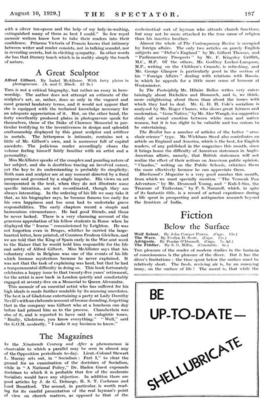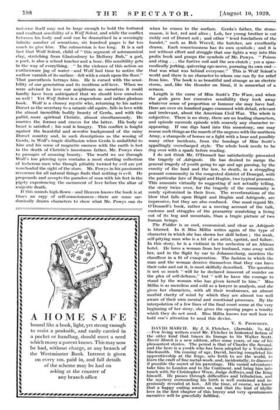Fiction
Below the Surface
Tim pleasure of the reader of modern studies in the fantasia of consciousness is the pleasure of the diver. But it has the diver's limitations ; the time spent below the surface must be relatively short. The fresh, reviving air is, by an annoying irony, on the surface of life ! The moral is, that while the
universe itself may not be large enough to hold the tortured and exultant sensibility of a Wolf Solent, and while the conflict between his body and soul can be dramatized in a seemingly infinite number of sensations, six hundred pages is far too much to give him. The submersion is too long. It is a sad fact that Wolf Solent, child of "this segment of astronomical clay, stretching from Glastonbury to Melbury Bub," a god, a poet, is also a school teacher and a bore. His sensibility gets in the way of everything. "In the violence of this action an earthenware jug of water—and Wolf had time to notice the mellow varnish of its surface—fell with a crash upon the floor." That parenthesis betrays him. He is cursed with the sensi- bility of our generation and its insidious self-love. When we were advised to love our neighbours as ourselves it could hardly have been anticipated that we should love ourselves so well ! Yet Wolf Solent is a stupendous and rather glorious book. Wolf is a clumsy mystic who, returning to his native Dorset as the secretary to a satanic old squire, falls in love with the almost incredible bodily beauty of Gerda, and with the pallid, more spiritual Christie, almost simultaneously. He marries the former and craves for the latter. His body or heart is satisfied ; his soul is hungry. This conflict is fought against the beautiful and macabre background of the rainy Dorset country and, in such descriptions as the wooing of Gerda, in Wolf's tragic disillusion when Gerda is unfaithful to him and his sense of magnetic oneness with the earth is lost in the death of Christie's incestuous father, Mr. Powys rises to passages of amazing beauty. The world we see through Wolf's too piercing eyes contains a most startling collection of lecherous men who though pitiably twisted by evil are yet vouchsafed the sight of the stars. Mr. Powys in his passionate reverence for all natural things finds that nothing is evil. He propounds and accepts the paradox of man with his feet in the pigsty experiencing the sacrament of love before the altar of majestic death.
If this sounds high-flown--and Heaven knows the book is at times an orgy of self-consciousness—there are some sar- donically drawn characters to show what Mr. Powys can do when he comes to the surface. Gerda's father, the stone- mason, is hot, red and alive ; Lob, her young brother is cut richly out of Dorset soil ; and other "lewd forefathers of the hamlet," such as Bob Weevil, the butcher, are excellently drawn. Each consciousness has its own symbols ; and it is not without effort and struggle that one fights a way into this prolix book and grasps the symbols of Mr. Powys. "Poison and sting. . . the furtive coil and the sex-clutch ; yes a spas- modically jerking, quivering ego-nerve, pursuing its own end— that was what was behind everyone." This is Wolf Solent's
world and there is no character to whom one can fly for relief from him. The book is as beautiful and strange as an electric storm, and, like the thunder on Sinai, it is somewhat of a sermon.
Length is the curse of Miss Scott's The Wave, and when the gods gave her excessive sensibility they took away whatever sense of proportion or humour she may have had. Here are over six hundred pages crammed with detail, relevant and irrelevant, about the American Civil War. The whole is subjective. There is no story, there are no leading characters, and episode succeeds episode with scarcely any character re- appearing. If one digs hard into this monotony, one may rescue such things as the march of the negroes with the northern Army, a stampede of horses or a fight with a bear and possibly many other incidents, from the bondage of Miss Scott's appallingly overcharged style. The whole book needs to be dug over with a spade before reading.
I do not think Mr. O'Donnell has satisfactorily presented the tragedy of Adrigoole. He has desired to merge the general tragedy of youth going to age and age passing, by the enmity of the land and the law, to death, in a struggling peasant community. in the congested district of Donegal, with the particular fate of Brigid and Hughie, two typical peasants. This amounts virtually to suggesting if not actually telling, the story twice over, for the tragedy of the community is surely epitomized in their lives. The reverberations of the blow that falls upon Brigid and Hughie and Adrigoole, are impressive, but they are also confused. One must regard Mr. O'Donnell's book, rather as a moving account of the talk, customs and struggles of the peasantry scratching a living out of its bog and mountain, than a tragic picture of two human beings.
The Fiddler is as cool, economical, and clear as Adrigoole is blurred. In it Miss Millin writes again of the type of character in which she has shown her skill before ; the weak, self-pitying man who is a bit of an artist, egotist, and failure. In this story, he is a violinist in the orchestra of an African hotel. He lures a woman from her husband, runs away with her, and in the flight by car to Johannesburg, murders the chauffeur in a fit of exasperation. The fashion in which the man and the woman deceive themselves that they can have their cake and eat it, is most skilfully described. The question is not so much "will he be declared innocent of murder on the plea of self-defence," but "will he have the courage to stand by the woman who has given herself to him." Miss Millin is as merciless and cold as a lawyer in analysis, and she gives her characters, with all their weaknesses, an almost morbid clarity of mind by which they are almost too well aware of their own mental and emotional processes. By the interpolation of a few lines of the final court scene at the very beginning of her story, she gives the opening pages a tensity which they do not need. Miss Miffin knows too well how to hold one's attention to need this device.
V. S. PRITCHETT.

































 Previous page
Previous page